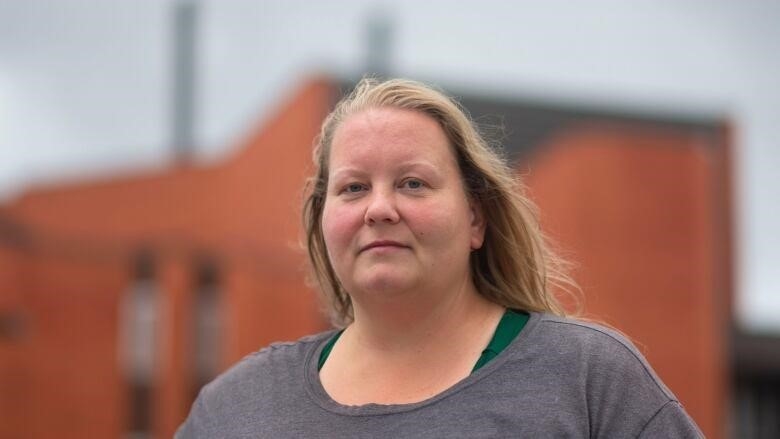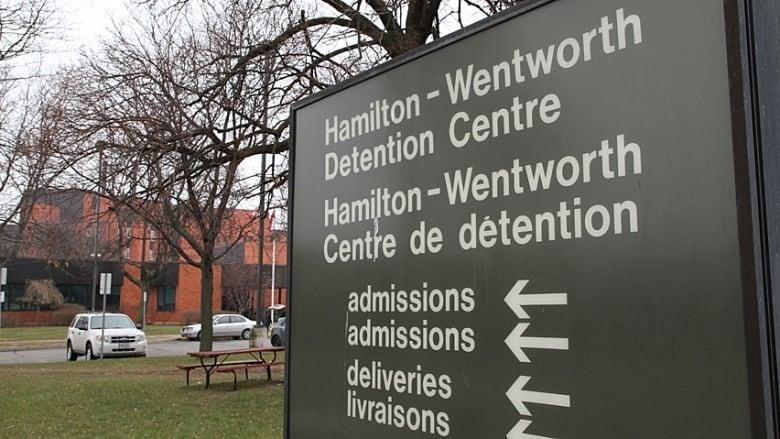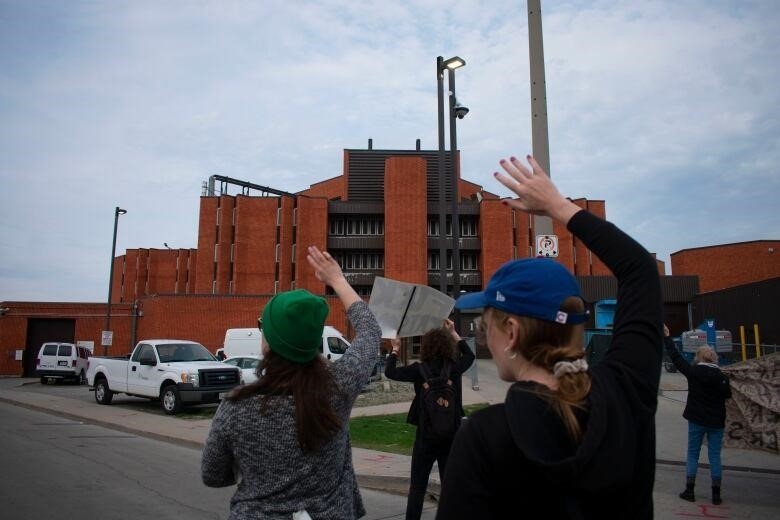
Through an access to information request, CBC Hamilton gets records of “informal” complaints
A person who beat cancer says he wasn’t given pain medication.
A man who lost 42 pounds says he couldn’t find the right food for a medical condition.
After being in the back of a hot van for hours during the summer, another man thought he was going to die.
Someone said that they had been sexually assaulted.
These are just a few of the things that Hamilton-Wentworth Detention Centre inmates called a provincial phone line about in 2022. It’s the same place where prisoners went on hunger strikes in 2020, 2021, and earlier this year because of what some have called bad conditions inside the maximum-security jail.

After submitting a freedom of information request, CBC Hamilton got documents with what are called “informal complaints.” The documents show what the complaints are about and how many there are. They also show that there is no way to track if and how they are resolved.
Former prisoners who now fight for prisoners’ rights say that the “formal” complaint process through Ontario’s ombudsman can take too long to be helpful.
They say that the complaints from the Hamilton institution are common and similar to those heard all over Ontario. This shows that the provincial and federal governments need to make jail conditions better.
Cedar Hopperton, a former Hamilton prisoner and volunteer with the Barton Prisoner Solidarity Project, said, “Every single complaint is shocking and disgusting, but in the end, it’s not surprising.”
Pain that is “brutal and excruciating
According to the documents, the Client Conflict Resolutions Unit, superintendents, and regional directors received 32 informal complaints in 2022.
The Ministry of the Solicitor General runs the unit, which is a toll-free phone number for inmates all over Ontario. It connects them to a “adviser” who, with the inmate’s permission, can work with the institution to solve problems.
Twelve of the complaints in the documents were about health care or access to health care.
In one case, an inmate was on a waiting list for at least a month while he was in “brutal and excruciating” pain because his top molar broke and exposed his nerve. He said that the nurse gave him Tylenol and clove oil to numb the area, but it didn’t help.
According to another complaint, a male inmate was put on suicide watch and had to wait more than a day to see a doctor.
A different complaint from a male inmate says he had hallucinations, was often put in isolation, and hadn’t showered in two months.
Another inmate with a genetic condition called acid reflux said he had lost 42 pounds because the staff kept giving him acidic food, even though he had told nurses, doctors, staff, and his lawyer about his condition.
Other prisoners said it was hard for them to get the medicines they said they needed.
CBC Hamilton told Hamilton-Wentworth Detention Centre inmate James Gales about the complaints in the documents during a phone interview.
Access to health care has been a “real problem,” according to Gales, especially since the pandemic started in early 2020.
‘Hell for 3.5 hours
Concerns about safety and problems with the bedding or laundry were also brought up in complaints.
One of the complaints is a handwritten letter from a prisoner who says they were sexually assaulted in late 2021.
A different inmate said that he and seven other inmates were in “agony” and thought they were “going to die” when they were in the back of a van during the summer and hot air was blowing at them.
“Another prisoner went to the bathroom in his jumpsuit because he was afraid… The complaint said, “They went through this hell for 3.5 hours.” “These officers should be fired for what they did, because they are going to kill someone.”
The prisoners were said to be “shouting and pounding on the doors” after being “cooked” in the back of the van.
In a different complaint, a man asked to be moved out of the facility because he didn’t know anyone there. This made other inmates think he was an undercover officer.
He said that two other prisoners “severely beat” him and gave him “several facial fractures.”

The documents also say that on a snowy night in February, five different inmates had to stay up all night because they didn’t have enough blankets and bed sheets to keep them warm.
“Without blankets and sheets, it’s impossible to sleep at night,” says one complaint.
Gales said that he and other people “never” get clean blankets and only get “one blanket for your entire stay.”
People complained about not being able to get their mail for up to a month and not being able to get religious or spiritual services, among other things, through the Client Conflict Resolutions Unit’s informal complaints system.
Gales said that he has dealt with both of those. He noticed that the chapel in the prison had been shut down.
“That could change the lives of some men,” he said.
A coordinator for freedom of information at the Ministry of the Solicitor General told CBC Hamilton that there is no paperwork about how informal complaints are handled.
But the coordinator also said that some problems could be solved quickly. For example, if an inmate complains about missing a phone call or a nurse appointment, this could be fixed quickly.
Formal complaints are being brought to COVID
A CBC analysis of formal complaints sent by inmates to the Ontario Ombudsman’s office by letter or phone call shows that the number of problems by inmates in Hamilton was rising steadily each year until the pandemic.
Annual ombudsman reports show the number of complaints from the institution and give some examples, but they don’t show what kinds of complaints are made in each prison or how many are resolved.
Some of the informal complaints made by Hamilton inmates are reflected in the 2021 ombudsman report. Health problems and lack of access to health care or medication were the most common complaints made by inmates across Ontario.
Other common provincial complaints are that staff use too much force and that people can’t get to cultural or spiritual programs or services.
The Ontario Ombudsman, Paul Dubé, turned down an interview request. In a statement, he said that his office had made suggestions to fix different problems with the way jails work, and that the provincial government had accepted most of them.
He also said that his office contacts the facilities, follows up with them, and meets with superintendents and senior ministry staff to make sure that action is being taken.
“It sounds like everything else we’ve heard.
Trish Mills is a former inmateAt the Hamilton jail and a co-leader of the Disability Justice Network of Ontario’s prison project.
Mills said that the complaints “repeat everything we’ve heard so far.”
The goal of the project is to talk to current and former Ontario inmates with disabilities who say they’ve been treated unfairly because of their disabilities while in prison or using the justice system.
She said that since August 2022, she has heard from more than 50 prisoners. Many of them have complained about medical care, being mistreated by staff, the state of the prison, and not having enough time to use the prison yard.
“If you don’t have a mental health problem when you go to prison, you probably will have one when you get out,” Mills said.

Hopperton remembered how hard it was to get help when she broke her toe in the Hamilton jail.
She also said that getting dental care was almost impossible. “People are taking threads from their sheets to use as dental floss.”
Hopperton also said that she remembers being so hot in a van that she passed out.
Mills said that there isn’t enough control over informal complaints.
Andrew Morrison, a spokesman for Ontario’s Ministry of the Solicitor General, said that the ministry is “committed to the health and well-being of all inmates.”
Most prisoners suffer instead of whine
Hopperton said that when she was in jail, she filed complaints with the ombudsman, but she was let out before some of the problems were fixed.
Dubé said that inmates are “vulnerable” and “at risk of not having their rights respected,” but he said that his office has “made sure” that they get answers quickly.
He gave examples of cases that were handled quickly, such as helping inmates who were afraid for their lives and speeding up dental care. In the examples, it wasn’t clear how long it took to solve each problem after the complaint was made, but he said that his office got in touch with the facilities right away.

Hopperton and Mills said that both the formal and informal ways to make a complaint are so ineffective that they make prisoners less likely to do so. They said that prisoners are afraid to talk to the sergeant because the sergeant might punish them.
Hopperton said, “Most people don’t complain; they just go through bad things.”
Hopperton and Mills both think that the real number and types of complaints are higher than what has been written down.
For example, inmates at the Hamilton jail went on a hunger strike this summer because they were upset about being locked up all the time, not getting enough time outside, problems with mail service, and the possibility of losing specialty TV channels. However, only mail service problems were part of the 2022 informal complaints.
Jesse Bull, the prisoner who said he started the hunger strike, told CBC Hamilton in the past that not enough is being done to make things better.
He said, “I just have the feeling that this is one of those problems that will never be fixed. It’s a broken system.”
Hopperton said that even though the strike is over, getting to the mail and the yard is still a problem.
The Ministry of the Solicitor General didn’t explain how it plans to deal with these problems.
People want to get rid of the prison system
Mills and Hopperton said that the best way to solve these problems is to get rid of the carceral system altogether, because it does more harm than good.
“They don’t help people get better. Instead, they create inhumane conditions that make people suffer more and more,” she said.

Mills said that it’s not realistic to let all inmates out at once, but it is realistic to take steps, like listening to inmates’ stories and letting them out in smaller groups.
She talks about how over 2,300 prisoners were let out during the pandemic so that the virus wouldn’t spread in jails.
“That showed that we can do this as a group, as prisoners. We’re capable. Mills said, “It’s time to think about how to grow without setting anyone up to fail.”
